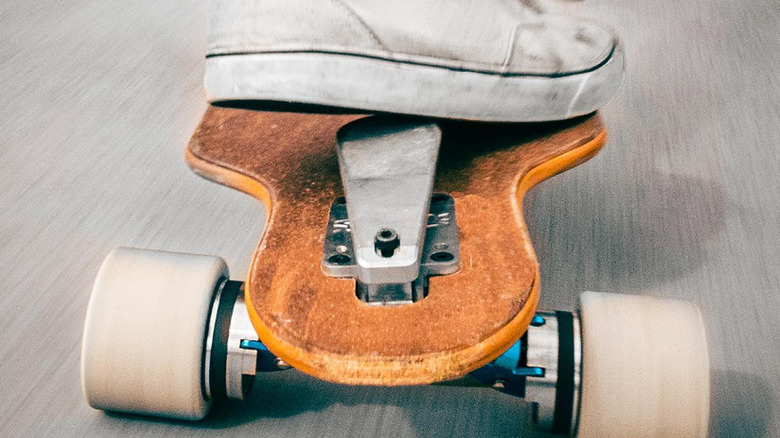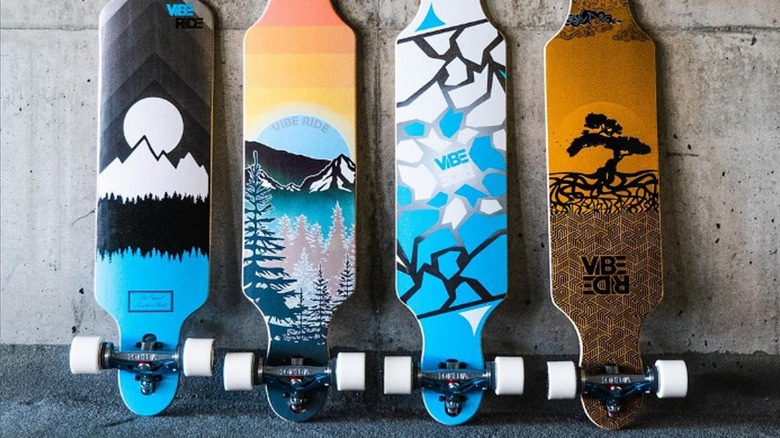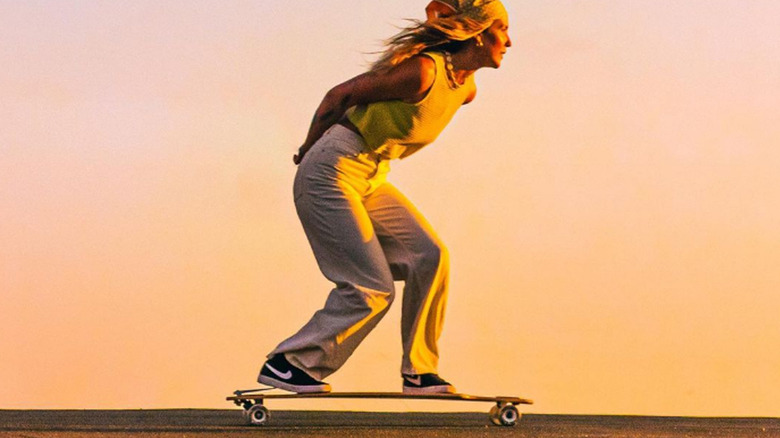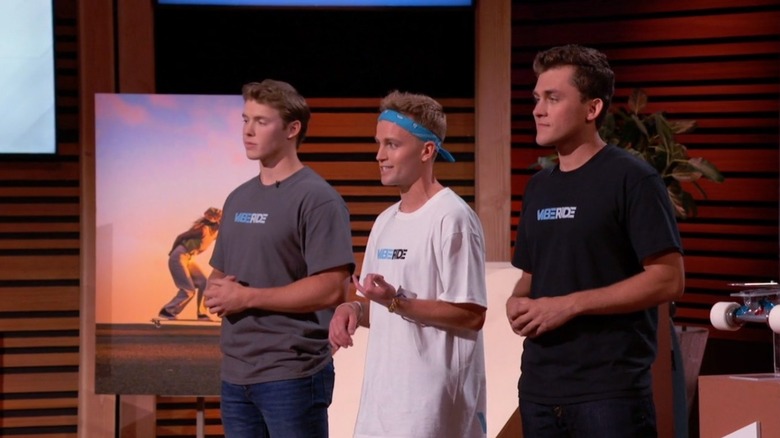5 Facts About VibeRide From Shark Tank
On "Shark Tank" Season 15, Episode 10, the founders of a business called VibeRide attempt to convince the Sharks that their proprietary longboard braking system isn't just a novelty but a paradigm shift for their industry.
Back in Season 6, the inventors of a sports product called Spikeball appeared on "Shark Tank" and tentatively agreed to a deal with Daymond John. While the investment they negotiated on-air eventually fell through after cameras stopped rolling, Spikeball still exploded in popularity. Since VibeRide is also aiming to innovate in the world of sports, the rapid growth of Spikeball serves as a sort of template for the founders.
The basis for VibeRide's existence is the fact that stopping a longboard during or after skating down a steep hill can be difficult. The VibeRide system makes braking as simple as pushing down on a lever installed near a longboard rider's back foot. In addition to easing the process for those unfamiliar with traditional foot braking, it also saves the rubber on the bottom of shoes from otherwise inevitable wear. On "Shark Tank," the young owners of VibeRide are hoping that these innovations will impress the Sharks enough to help them kick off a Spikeball-esque growth.
The idea for VibeRide dates back to 1999
VibeRide started up in 2023, so its "Shark Tank" appearance in January 2024 is coming relatively early on in the company's existence. That said, the braking technology around which the company revolves is much older, originating with a design supposedly sketched — like all genius ideas are in popular mythology — on a paper napkin.
The three founders of VibeRide decided that they wanted to start a longboard brake company based on their own experience. After developing this idea for a number of years, they decided to purchase the patent for a product known as the Brakeboard. Australian product designer Ben Newman spearheaded the sales of his Brakeboard technology starting in 1999, continuing through the 2000s, and persisting even into the 2010s. In 2006, notably, Newman won an episode of an Australian ABC show somewhat similar in premise to "Shark Tank" called "The New Inventors." He also funded the Brakeboard on Kickstarter as recently as 2013.
Now the former Brakeboard website redirects to VibeRide's homepage. So, while the company is new, it's building on decades of history, presumably in hopes that its current owners have the business acumen to popularize the product to an extent Newman could not on his own.
Company co-founder Charlie Cannon is a former professional athlete and a skilled entrepreneur
VibeRide's founders are younger than the average "Shark Tank" competitor — Charlie Cannon, Carson Macdonald, and Chris Goodhue started the company at 23, 22, and 27 years old respectively. The trio first started working together as students at the University of Utah, and they seem to have wasted little time getting their big idea off the ground.
While Goodhue and Macdonald each bring relevant experience to the table in their own right, it's Cannon's background in particular that may well be VibeRide's secret weapon. At just 18 years old, Cannon signed a deal with a ski brand called J Skis. His job was to market the brand by showcasing some of its products in eye-catching skiing videos tailor-made for social media.
Then, when he was 19, Cannon started a drone business called EXO Drones. Over the course of two years, that company's sales exceeded $15 million. He sold EXO Drones in 2022, making him a multi-millionaire and freeing him up to start VibeRide with his present-day business partners.
They company is big on social media
Social media was the focus of VibeRide founder Charlie Cannon's work for J Skis, and he credits his personal social media acumen for the rapid growth of EXO Drones. It's hardly surprising, then, that social media is also a major pillar of VibeRide's business model.
Reflecting its three founders' young ages, TikTok and YouTube are the two platforms VibeRide most actively utilize. On TikTok, the company's following totals just over 10,000 users. Its videos amass view counts in the tens of thousands regularly, with some particularly viral clips netting view counts in the millions. Meanwhile, more than 12,000 users subscribe to the VibeRide YouTube channel, which produces Gen Z-friendly Shorts more often than full-length videos. A few of those Shorts have even surpassed 1 million views.
One of the company's marquee social media achievements is a spotlight on Braille Skateboarding, a popular YouTube channel with more than 5 million subscribers. It's clear, then, that VibeRide's appearance on "Shark Tank" within a year of its founding is at least partially the result of its growth. That growth, as the stats suggest, was possible thanks to a successful social media push and the rapid exposure that followed
VibeRide sells its braking system both as a standalone device and pre-installed on longboards
VibeRide customers can choose between purchasing just the company's proprietary braking system or full longboards on which the system is pre-installed.
The standalone device retails for $269 and was available at a sale price of $169 around the time of the company's "Shark Tank" episode as part of a New Year promotion. In addition to a pair of trucks to which wheels and the brake are already attached, VibeRide includes all of the tools necessary to attach the system to a standard longboard.
Meanwhile, VibeRide sells complete longboards with its brakes pre-installed under the BrakeBoard nomenclature, retaining the name of the older product in its direct lineage. BrakeBoards retail for $359 and were available for as low as $259 during the company's New Year sale. While each BrakeBoard's deck shape is identical, VibeRide offers a handful of designs, each of which incorporates the company's logo in a visually distinct fashion.
Also available on the VibeRide web store are T-shirts, individual replacement parts, a brake pedal extension device, and even an electric longboard that retails for $899.
VibeRide's founders are betting on big changes coming soon to the skateboarding business
The business growth VibeRide hopes to experience doesn't just hinge on its social media popularity but an expectation that its flagship product will tap into a brand-new market not previously served by traditional longboards.
This notion hinges partially on a poll that determined participants were likely to substitute bikes or scooters for skateboards with brakes. This hints that a braking system may be the very thing some people require to give skateboarding a try for the first time.
VibeRide's founders, Charlie Cannon, Carson Macdonald, and Chris Goodhue, aren't the only ones who believe in this technology. Hundreds of thousands of dollars in sales in the company's first three months of existence, for instance, suggest that those poll results were accurate and customers are genuinely interested in the VibeRide device. Meanwhile, a major investor whose identity is currently under wraps purportedly has a significant financial stake in the company, the details of which are expected to become public at some point in the first half of 2024. VibeRide already boasts some impressive numbers to back up the efficacy of its product, then, heading into the "Shark Tank" studio.
What happened to VibeRide on Shark Tank?
Charlie Cannon, Chris Goodhue, and Carson Macdonald ride into the tank seeking $250,000 in exchange for 10% equity in their business VibeRide. As the energetic trio explains, their company is the only one to sell a skateboard with a brake system, which Charlie demonstrates live for the sharks by riding down a ramp and coming to a smooth, controlled stop. The idea for the brakes came from a desire to ride downhill without having to constantly worry about wiping out and the system has been tested at up to 50 miles per hour. The sharks are impressed, and they haven't even gotten into the numbers yet.
The VibeRide trio reveals that in the two months that their boards have been available for pre-sale, they've already made an impressive $150,000. They also expect to hit $600,000 in sales by the end of the year. Beyond the raw sales figures, the trio also impresses the sharks with their savviness regarding their product. Charlie has invested a whopping $1.2 million into the business and he explains that $450,000 of that went to buying up existing patents for skateboard brakes. They currently hold six utility patents for their skateboard brake system.
It's for all those reasons that Mark Cuban calls the guys "the real deal" when he jumps in to make an offer. He proposes the $250,000 that was initially asked for but with 15% equity. Charlie counters with an offer of $350,000 for the 15%, and Cuban pivots to $250,000 for 12%. Charlie counters again, but Cuban stands firm, and before any other shark can jump in on the negotiation, the guys take the deal and ride out of the tank smiling.





